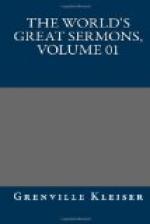voices, but by evil works, do wicked Christians repress
the good. A good Christian has no wish to attend
the public shows. In this very thing, that he
bridles his desire of going to the theater, he cries
out after Christ, cries out to be healed. Others
run together thither, but perhaps they are heathens
or Jews? Ah! indeed, if Christians went not to
the theaters, there would be so few people there that
they would go away for very shame. So then Christians
run thither also, bearing the Holy Name only to their
condemnation. Cry out then by abstaining from
going, by repressing in thy heart this worldly concupiscence;
hold on with a strong and persevering cry unto the
ears of the Savior, that Jesus may stand still and
heal thee. Cry out amid the very crowds, despair
not of reaching the ears of the Lord. For the
blind man in the Gospel did not cry out in that quarter
where no crowd was, that so they might be heard in
that direction, where there was no impediment from
persons hindering them. Amid the very crowds they
cried out; and yet the Lord heard them. And so
also do ye even amid sinners, and sensual men, amid
the lovers of the vanities of the world, there cry
out that the Lord may heal you. Go not to another
quarter to cry out unto the Lord, go not to heretics
and cry out unto Him there. Consider, brethren,
how in that crowd which was hindering them from crying
out, even there they who cried out were made whole.
WYCLIF
CHRIST’S REAL BODY NOT IN THE EUCHARIST
BIOGRAPHICAL NOTE
John Wyclif, eminent as scholar, preacher, and translator,
was born in 1324 in Spresswel, near Richmond, Yorkshire,
England. Known as the “Morning Star of
the Reformation” he was a vigorous and argumentative
speaker, exemplifying his own definition of preaching
as something which should be “apt, apparent,
full of true feeling, fearless in rebuking sins, and
so addrest to the heart as to enlighten the spirit
and subdue the will.” On these lines he
organized a band of Bible preachers who worked largely
among the common people.
Much of Wyclif’s popularity was due to his clear
and simple style. While not a great orator, he
introduced a popular method of preaching that was
widely copied. He died at Lutterworth in 1384.
The Church considered him a heretic, for he taught
the right of the individual to form his own opinions
after personal study of the Scriptures. He was
the first Englishman to translate the Bible systematically
into his native Anglo-Saxon. In 1428, by order
of Pope Martin V, his bones were exhumed and burned,
and the ashes thrown into the river Swale.
CHRIST’S REAL BODY NOT IN THE EUCHARIST
This is my body.—Matt. xxvi., 26.




